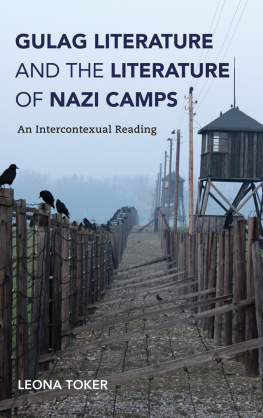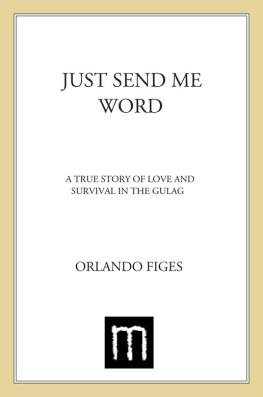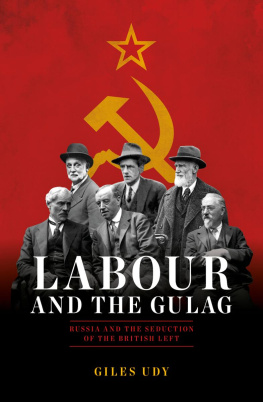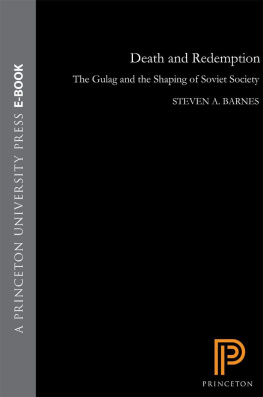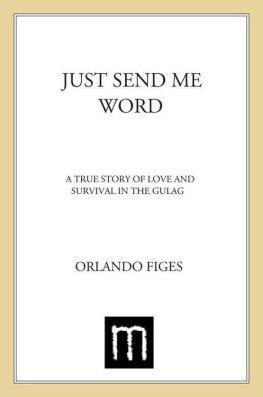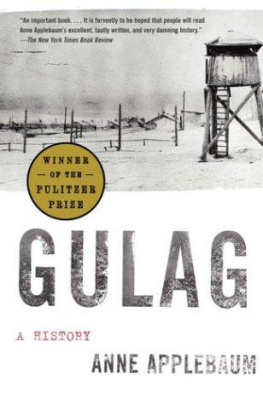Formakov Arsenii - Gulag Letters
Here you can read online Formakov Arsenii - Gulag Letters full text of the book (entire story) in english for free. Download pdf and epub, get meaning, cover and reviews about this ebook. City: Soviet Union, year: 2018;2017, publisher: Yale University Press, genre: Home and family. Description of the work, (preface) as well as reviews are available. Best literature library LitArk.com created for fans of good reading and offers a wide selection of genres:
Romance novel
Science fiction
Adventure
Detective
Science
History
Home and family
Prose
Art
Politics
Computer
Non-fiction
Religion
Business
Children
Humor
Choose a favorite category and find really read worthwhile books. Enjoy immersion in the world of imagination, feel the emotions of the characters or learn something new for yourself, make an fascinating discovery.

- Book:Gulag Letters
- Author:
- Publisher:Yale University Press
- Genre:
- Year:2018;2017
- City:Soviet Union
- Rating:4 / 5
- Favourites:Add to favourites
- Your mark:
- 80
- 1
- 2
- 3
- 4
- 5
Gulag Letters: summary, description and annotation
We offer to read an annotation, description, summary or preface (depends on what the author of the book "Gulag Letters" wrote himself). If you haven't found the necessary information about the book — write in the comments, we will try to find it.
Gulag Letters — read online for free the complete book (whole text) full work
Below is the text of the book, divided by pages. System saving the place of the last page read, allows you to conveniently read the book "Gulag Letters" online for free, without having to search again every time where you left off. Put a bookmark, and you can go to the page where you finished reading at any time.
Font size:
Interval:
Bookmark:
THE YALE-HOOVER SERIES ON AUTHORITARIAN REGIMES
GULAG LETTERS
ARSENII FORMAKOV
EDITED, TRANSLATED, AND WITH AN INTRODUCTION BY EMILY D. JOHNSON
Hoover Institution
Stanford University
Stanford, California
Yale UNIVERSITY PRESS
New Haven and London
Financial support was provided by the Office of the Vice President for Research, the Provost, and the College of Arts and Sciences of the University of Oklahoma.
Copyright 2017 by Yale University and the Board of Trustees of the Leland Stanford Jr. University.
All rights reserved.
This book may not be reproduced, in whole or in part, including illustrations, in any form (beyond that copying permitted by Sections 107 and 108 of the U.S. Copyright Law and except by reviewers for the public press), without written permission from the publishers.
Letters and photographs from the Arsenii Ivanovich Formakov Papers, Hoover Institution Archive, reprinted by permission of Ausma Polonska, for the estate of Arsenii Formakov.
Correspondence of Aleksandr Solzhenitsyn published with the permission of Natalia Solzhenitsyn.
Yale University Press books may be purchased in quantity for educational, business, or promotional use. For information, please e-mail (U.K. office).
Set in Sabon and Berthold City Bold type by Newgen North America.
Printed in the United States of America.
Library of Congress Control Number: 2016953815
ISBN 978-0-300-20931-0 (hardcover : alk. paper)
A catalogue record for this book is available from the British Library.
This paper meets the requirements of ANSI/NISO Z39.48-1992 (Permanence of Paper).
10 9 8 7 6 5 4 3 2 1
Contents
by Emily D. Johnson
Acknowledgments
Many people, organizations, and institutions provided help and support as I worked on this project. I am grateful to Julie Cassiday, Alan Barenberg, Golfo Alexopoulos, Carol Ueland, Lazar Fleishman, Mark Harrison, Norman Naimark, and the anonymous readers who evaluated my manuscript for their suggestions for improving the text. Boris Ravdin provided a great deal of assistance in preparation for and during my research trip to Latvia. Dan Healey and Nikita Lomagin both helped when I had questions about archival materials. I am very grateful to have had the opportunity to participate in the Hoover Institutions Summer Research Workshop on Authoritarian Regimes on several occasions. Paul Gregory played a key role in encouraging my work on this project. I am very grateful to Lora Soroka, Carol Leadenham, Eric Wakin, and the staff at the Hoover Institution Archive and Library for their assistance. The staff of the Memorial Society in Moscow, the Scientific-Information Center of Memorial in St. Petersburg, the State Archive of the Russian Federation, the Museum of the Occupation of Latvia in Riga, and the State Archives of Latvia were generous with their time and assistance. Molly Murphy and the staff of the Inter-library Loan Department at the University of Oklahomas library worked miracles. My parents, Phil and Kathie Johnson and Leith Johnson and John Martinez, all helped facilitate the research travel required for this project by stepping in at key moments to provide childcare. My daughter Cerria was remarkably patient as I worked on the manuscript. Catharine Nepomnyashchy provided support and advice until her death and is sorely missed.
Funds provided by the National Council for Eurasian and East European Research (NCEEER) and American Councils, under authority of Title VIII grants from the U.S. Department of State, supported the work contained in the to this volume, and to Ausma Polonska for allowing me to share her familys story.
Note on Transliteration, Punctuation, and Formatting
Although standard Library of Congress transliteration is employed in most places in this book, the spelling of some names (Evgenia, Dmitri, Ananievich, Vertinsky) has been simplified in the interest of accessibility or in keeping with established tradition. The first name Alexander is generally spelled in keeping with English-language norms. In the case of the author Solzhenitsyn, I use the transliteration Aleksandr because this is the name that he published under in English. Places in which the letters have been abridged are marked with a bracketed ellipsis; other ellipses reflect the punctuation used in the original Russian-language text. As a general rule, titles of books and films are provided in transliterated Russian followed by an English translation in brackets or parentheses when first used. In some instances, I have defaulted to the English when these titles reappear, with an eye to making the book more accessible to nonspecialists. Periodical titles (such as Pravda and Izvestiia) are generally provided in transliterated Russian, as is the norm in most publications. In rare instances where this seems likely to impede the understanding of nonspecialists, I default to English. In the case of some very well known works of literature (such as One Day in the Life of Ivan Denisovich and Dead Souls), I have opted to omit the transliterated Russian.
Introduction
Emily D. Johnson
ON DECEMBER 2, 1944, a fellow inmate who served as the head of the accounts department at the local outpost of the Krasnoiarskii Labor Camp (Kraslag) ran over to see Arsenii Formakov at the needle-making shop where he worked. Lets see you dance, he teased, and handed Formakov the postal form that accompanied a wire transfer sent from Riga. Formakov recognized his wifes handwriting, and tears welled up in his eyes as he read the brief, tender note that she had written at the bottom of the form for him: this was the first communication that he had received from her in three and a half years. Within days a real letter followed. For the next three years, until his release from the labor camp in December 1947, Formakov remained in regular communication with his wife and children. The letters that he sent them during this first term in the camps and, to a lesser extent, during a later period of confinement (19491955), which today form part of the Hoover Institution Archives extensive holdings on the history of the Baltic states and the Soviet labor camp system, represent the subject of this volume. These documents offer an immediate eyewitness account of daily life in a typical Soviet labor camp and provide a sense of the difficult choices that inmates faced as they struggled to survive.
A number of factors began to change this situation at the end of the 1920s, leading to the rise of the mass system of forced labor that Formakov would encounter in the 1940s. The crash industrialization campaign introduced with the First Five-Year Plan led to ambitious construction projects and efforts to extract natural resources in distant, forbidding locations that required vast reserves of unskilled labor just as new purges and the ruthless collectivization campaign were increasing the numbers of incarcerated exponentially. In one respect, however, this drive clearly succeeded: it spread a model of camp organization and forced labor developed in the 1920s at secret policerun detention sites, including the notorious Solovetsky labor camp, across the length and breadth of the Soviet Union, allowing the penal system to expand and absorb the wave of victims sentenced during the great purges of the late 1930s. Over time, Gulag came to signify not just the administrative unit that governed the labor camp system beginning in the 1930s, but also the Soviet penal system as a whole.
By the start of World War II, when Formakov received his first sentence to hard labor, the population confined in Soviet labor camps and colonies stood at 2.3 million. Nonetheless, inmates faced continual demands that they increase their work output and thereby aid in the war effort.
Next pageFont size:
Interval:
Bookmark:
Similar books «Gulag Letters»
Look at similar books to Gulag Letters. We have selected literature similar in name and meaning in the hope of providing readers with more options to find new, interesting, not yet read works.
Discussion, reviews of the book Gulag Letters and just readers' own opinions. Leave your comments, write what you think about the work, its meaning or the main characters. Specify what exactly you liked and what you didn't like, and why you think so.


